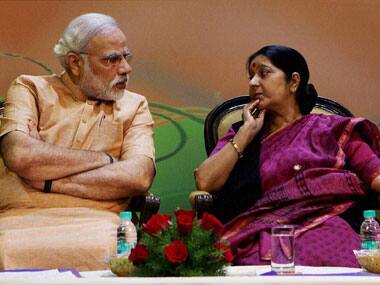The BJP is planning to reach out to the Muslims. It should be good news for the polity. The more it does so, the more the party is going to resemble the Congress in its social composition and the more it would require to dissociate itself from the Hindutva hotheads in the Sangh Parivar fold. It’s not a bad move from a party faced with stagnation in national vote share and struggling to find pan-Indian acceptability because of its association with political Hindutva. [caption id=“attachment_1044247” align=“alignleft” width=“380”]  Modi has set an ambitious target of 272-plus for the party in the 2014 general elections. PTI[/caption] The move is late by at least a decade. However, if the party is sincere and it manages to keep outfits such as the Vishwa Hindu Parishad and the Bajrang Dal out of the picture, it could end up winning over an appreciable section of the Muslims to its side. It would also find support from the sections of the electorate who are not necessarily infatuated with the Congress, but are forced to side with it because of the perceived threat from the rabid hardliners to the socio-cultural fabric of the country. Muslims are never the monolithic vote bank that they are made out by many political analysts. While they don’t normally go with the BJP for obvious reasons, they don’t vote for the Congress en masse. In the states, they vote for other alternatives — for example, the Samajwadi Party in Uttar Pradesh, the Trinamool Congress in West Bengal, the Rashtriya Janata Dal or Janata Dal(U) in Bihar. Here, too, there’s hardly en bloc voting. There are intra-community divisions within the Muslims akin to the caste system among Hindus and there is strong resentment among the pasmandas — those lower in the hierarchy — against the well-off ashrafis . All of them band together when there is a threat perception to the community. This is the tendency all so-called secular parties have been exploiting over the decades. If the BJP removes that threat perception, it would be in a position to win over a section of the Muslims, particularly the pasmandas. However, it’s not as easy it sounds given the ideological background of the party and the strong anti-Muslim position of some outfits in the wider Sangh umbrella. Still it is worth a try if the party is serious about growth. It’s interesting that Narendra Modi, a person identified with hardline Hindutva and not so great a record when it comes to treatment of Muslims, would be person initiating the process. But give it to the man. One might disagree with his brand of politics on several counts. It is crude, loud, manipulative and aimed at wooing the galleries. But he understands grassroots electoral politics much better than most of his peers in the BJP. He realises it takes much more than quotable quotes, smart debating skills, goodwill of the middle class and support of the media to win elections. He realises that the party would head nowhere without a change in approach towards the Muslims and changing perceptions at the booth level. It need not be about garnering Muslim votes in large numbers per se but it is important from the point of view of changing the public perception of him and the party. Modi has set an ambitious target of 272-plus for the party in the 2014 general elections. It won’t be possible without winning over a big chunk of anti-Congress, but not pro-BJP votes. He has been clever enough to shift his Muslim strategy gradually. He wants to appear more inclusive now. Not long ago, he spoke about taking along 1.2 billion Indians on the path of development. He has also managed to ensure the silence of the Hindutva hawks. Don’t be surprised if he wears the skull cap sometime later and reaches out openly to the Muslim community. For all his perceived weaknesses, Modi is a smart strategist. He knows what works with the electorate. For those following his career path, his subtle, calculated shift should not come as a surprise. Where does that leave the Sangh Parivar? One can never tell. For all we know, it could have allowed Modi a free hand for now. It can never sacrifice its core beliefs and might assert itself at a time of its choosing. But for now, the BJP’s move appears to be on the right course.
It’s interesting that Narendra Modi, a person identified with hardline Hindutva, would be heralding mending of relations with the Muslims.
Advertisement
End of Article


)
)
)
)
)
)
)
)
)



